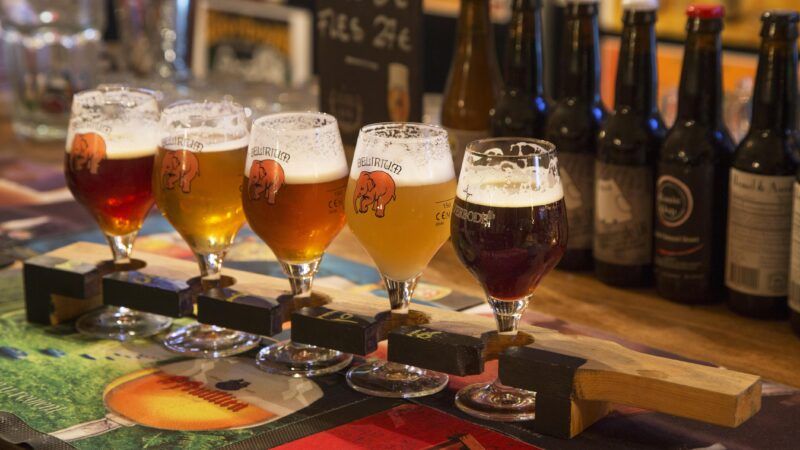Trump's New Trade 'Deal' With the E.U. Leaves Out Beer, Wine, Booze
The deal locks in the 15 percent tariffs that Trump has imposed on most European goods imported into the U.S., including beers and other booze that isn't made here.

Americans who enjoy German lagers, Belgian saisons, and Czech pilsners will get no relief from the higher tariffs that President Donald Trump has poured on their favorite brews.
The framework of a much-anticipated trade deal between the United States and the European Union was made public on Thursday. The deal locks in the 15 percent tariffs that Trump has imposed on most European goods imported into the U.S., but it also serves as a promise from the Trump administration not to target European goods with product-specific tariffs that could be announced in the coming weeks or months—including potentially huge new tariffs on pharmaceuticals, something the White House has been teasing for months. The deal also creates a pathway for the United States to reduce its tariffs on European cars to the 15 percent threshold, once the E.U. reduces some of its own tariffs on American industrial goods.
The written agreement seems to solidify the handshake deal struck in late July, though it is still "not a legally enforceable pact," but rather a step towards one, as The New York Times noted.
But for alcohol-related businesses and booze-loving consumers on both sides of the Atlantic, the "deal" seems more like a buzzkill.
"Beer has long been a cornerstone of EU-US trade, built on a unique ecosystem of collaboration," Julia Leferman, secretary general for Brewers of Europe, a trade association, said in a statement. "Restoring fair and reciprocal trade terms would allow the transatlantic beer market to flourish once more—to the benefit of farmers, brewers, distributors, hospitality workers and consumers in both Europe and the United States."
Indeed, beer is a great example of why free markets are so wonderful. American consumers get access to unique styles and brews from parts of Europe, while American farmers gain access to more markets to sell raw materials like hops and barley.
Raising barriers to that trade won't create more jobs in the United States. American breweries might be able to replicate a Belgian tripel, but they can't duplicate the versions that Trappist monks have perfected over the course of hundreds of years. The same is true for French wines and Irish whiskeys, all of which are sought after by American consumers for the unique qualities and histories they contain. With a 15 percent tariff, those little joys will be more expensive for some and out of reach for others.
Higher tariffs also mean fewer sales for alcohol-making businesses on both sides of the Atlantic.
"We commend the administration for safeguarding U.S. spirits from tariffs in the short term but without a permanent return to zero-for-zero tariffs on spirits, American distillers do not have the certainty to plan for future export and job growth without the fear of retaliatory tariffs returning," Chris Swonger, president and CEO of the Distilled Spirits Council of the United States, a trade association, said in a statement.
His counterpart in Europe expressed a similar sentiment. "While we appreciate the progress made in de-escalating broader trade tensions, every month of delay in restoring the zero-for-zero tariff agreement for spirits holds back growth, investment and consumer choice on both sides of the Atlantic," Hervé Dumesny, director general of SpiritsEurope, told Just Drinks, a trade publication.
It's often the case that governments impose higher tariffs at the request of a domestic industry to protect it from foreign competition. It's telling that the Trump administration's tariffs are not following that pattern—quite the opposite, as alcohol producers on both sides of the Atlantic want to see lower tariffs and more free trade. These tariffs are being implemented for purely political reasons, and they will continue to ferment problems in the booze industry, and beyond, until they are removed.
